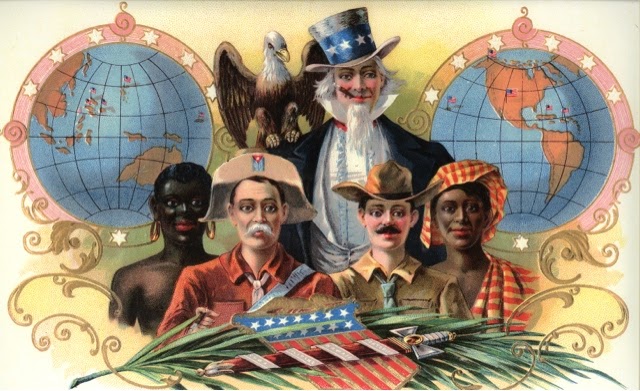The Cuban Affair
As America grew from the cub to the lion, it seemed that nothing could stand in its way. The United States could flex its military's muscle and send countries running. With no fear of a frontier, American expansionism had room to flourish. With the inalienable rights at heart, America stood as the all powerful justice and prosecutor for those who chose to oppress others. At the time Cuba, a colony of Spain, was in great need of freedom from its mother country. The United States saw this as a great opportunity to help those who needed it. While the sheer fact that Cubans were being denied inalienable rights was important, the actual trigger that set off the U.S. Invasion of Cuba was the explosion of the war ship Maine.
The Maine, on a non aggressive visit, was anchored off the coast of Havana. On February 15, 1898, to the shock of thousands, the Maine erupted into flames. The lives of 258 American men were taken on that tragic day. When news reached the American press, scapegoats were instituted. Among the most famous perhaps was the allegation towards the Spaniards, claiming that they had intentionally ordered the Maine to dock over an old naval mine. According to the New York Journal, "Wires connected the mines with a… magazine, and it is thought the explosion was caused by sending an electric current through the wire". Even the Assistant Secretary of the Navy ,Theodore Roosevelt, claimed that this was an act of sabotage on behalf the the Spanish loyalists. In actuality, evidence later showed that the explosion actually took place from within the Maine. Capt. Schuley, a respected naval captain, stated in the New New York Times that "He had found that with frequent and very careful inspection fire would sometimes be generated in the coal bunkers, and he told of such a fire on board of the New York close to the magazine, and so hot that the heat had blistered the steel partition between the fire and the ammunition before the bunkers and magazine were flooded". When the press used stories that fingered the Spaniards as the culprits, they were actually using a technique called yellow journalism. This type of journalism would only show one theory or side of a story that completely left out evidence, facts and motives. Yellow journalism played the emotional strings on many naive American hearts; thus proving it's crucial role in the decision to invade Cuba.
The millions of Americans who read and supported the theories that the Spanish were involved in the destruction of the Maine played a vital part in the decision to invade as well. The American people believed the sailors should be avenged. Patriotism was certainly evident in those who advocated to invade Cuba. Marie Elizabeth Lamb certainly felt the urge to share her nationalism and patriotism in the form of a poem called "Awake United States!". In Marie's poem, she begs for her fellow Americans to retaliate by stating, "Comrades will you go? Avenge the cruel blow!". With nationalistic works like Marie's and yellow journalism, there should be no wondering why the American people began to despise the Spanish. It was only a matter of time before the U.S. government heard the peoples cry for retaliation.
President Mckinley heard his people loud and clear. McKinley had these statements to share, ". . . The destruction of that noble vessel has filled the national heart with inexpressible horror. . . ." and ". . . [T]he destruction of the Maine, by whatever exterior cause, is a patent and impressive proof of a state of things in Cuba that is intolerable . . . .". These statements came directly from his war invoking message to Congress. This message relied on the principles of the Monroe doctrine. The Monroe doctrine stated that no European force could peruse in any aggressive affairs inside the Western Hemisphere. President McKinley was feeling the first hand effects of nationalism. Soon after this message of war, war was declared on the Spanish and the invasion of Cuba began.
Although there may have been a multitude of reasons why the U.S. Invaded Cuba, the most prominent reason was due to the explosion of the Maine. Yellow press played an important role when it pointed towards the Spanish as the main culprit. Even if the explosion was an accident, propaganda fueled nationalism encouraged the United States masses to call for war. Without the strong advocation on behalf of President McKinley and Theodore Roosevelt, Cuba may have never been liberated from Spain.
I believe that if the Maine didn't explode, the Spanish American War would not have occurred. The Spanish would have continued to thrive on the colonies they possessed, for example Cuba, the Philippines, Guam, and Puerto Rico. With this prolonged rule, the people of these colonies would have suffered unfathomable hardships. Meanwhile, the Spanish would be racking in fortunes and valuable resources. I could imagine many rebellions being formed to throw off the oppressive reigns of the Spanish. However, with little to no resources, the likelihood of an effect rebellion would have been futile. If the lives of those 258 sailors hadn't been taken, the lives of many more innocent people would have been taken by the oppressive Spanish.
Check out this awesome YouTube video dedicated to the Maine! http://youtu.be/FU--Ed_dggc
The information gathered from the quotes above came from the sources given to us by Mr. Thomas, on his schoology page.


No comments:
Post a Comment